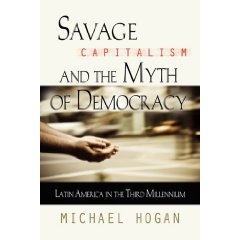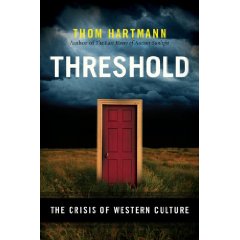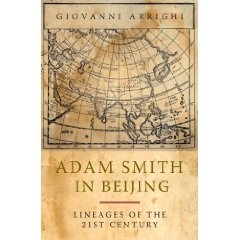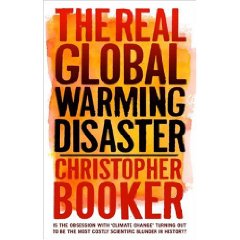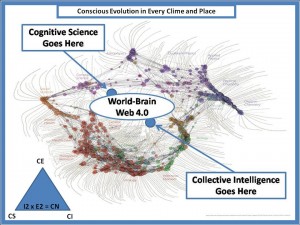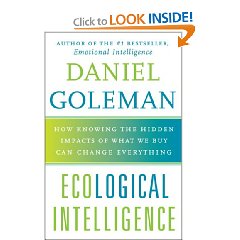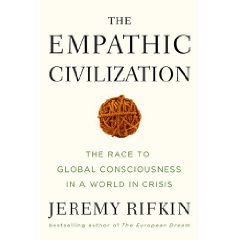
![]() HUGE Book, Deep Look From One Perspective
HUGE Book, Deep Look From One Perspective
January 14, 2010
Jeremy Rifkin
This is a society-changing piece of work.
This is a magnum opus from a very specific point of view that overlooks both major consciousness figures and major biosphere figures. Herman Daly gets one note, Tom Atlee, Barbara Marx Hubbard, Steve McIntosh are not in this book. Buckminster Fuller, Paul Hawken, the Meadows, E. O. Wilson on Consilience, J. F Rischard on HIGH NOON, etcetera, are not in this book. My review begins after the Table of Contents, which the publisher failed to provide using standard Amazon tools for publishers.
Table of Contents
I The Hidden Paradox of Human History
HOMO EMPATHICUS
2 The New View of Human Nature
3 A Sentient Interpretation of Biological Evolution
4 Becoming Human
5 Rethinking the Meaning of the Human Journey
EMPATHY AND CIVILIZATION
6 The Ancient Theological Brain and Patriarchal Economy
7 Cosmopolitan Rome and the Rise of Urban Christianity
8 The Soft Industrial Revolution of the Late Medieval era and the Birth of Humanism
9 Ideological Thinking in a Modern Market Economy
10 Psychological Consciousness in a postmodern Existential world
THE AGE OF EMPATHY
11 The Climb to Global Peak Empathy
12 The Planetary Entropic Abyss
13 The Emerging Era of Distributed Capitalism
14 The Theatrical Self in an Improvisational Society
15 Biosphere Consciousness in a Climax Economy
– – – – – – – –
If this book is reprinted, it should be single-spaced. The massive bulk (675 pages) is pretentious and not necessary, especially for those of us that read when traveling, and for students having to carry books around. As noted earlier the author leaves out a great deal and I will offer ten links below (and over 300 links at Phi Beta Iota the Public Intelligence Blog where I have posted “Worth a Look: Book Review Lists”). This review focuses on the righteous theme the author has pursued across multiple literatures.
The book's bottom line is well summarized in the jacket flaps and comes at the very end as the author aspires for a combination of biosphere consciousness and distributed capitalism, the latter made possible by a combination of backyard energy and global information and communications technologies (ICT). Early in the book the author discusses how the wealthy dominated water power in the Medieval Period, but the poor were able to use windmills anywhere–this makes an impression on me as it did on the author.
The author has a story to tell and as I go through the book I am constantly reminded of books and points not in this book, but I abandoned my first draft of my review because it focused too much on work by others and not enough on the enormous task this author has taken on. In a nutshell, the author believes that the same revolutions in energy and communications that lead to a growth in human consciousness also lead to a commensurate crisis in earth or biosphere viability. In today's era the potential crisis (widely anticipated in the 1970's and deliberately ignored by the White House and the Senate for selfish corrupt reasons) is playing a forcing function, potentially catalyzing the rethinking of philosophy, economics, and our social models.
There are three negatives to this book that for any other author or theme would have dropped the book to a four, but I feel a five is still warranted for both the heroic personal effort of the author, and the importance of the theme.
#1. There is no appreciation that I can see of the fact that we are returning to the wisdom of the indigenous cultures that we have genocided since 1941, not only in the USA but in Australia, Africa, and elsewhere. This is not new wisdom that the author is bringing to bear, but old wisdom that is being rediscovered.
#2. The author fell prey to the Climate Change manipulation of data and hyperbole as well as nine documented errors in the British law suit against Al Gore, who has been asked to return his Academy Award. I won't belabor this now that the fraud of Climate Change has been adequately exposed, I will just say this: the UN High Level Panel on Threats, Challenge, and Change is the more honest and substantive endeavor, and Environmental Degradation, #3 of 10 after Poverty and Infectious Disease, is properly ranked. Climate Change is less than 10% of that, and within Climate Change carbon emissions are 10% at most, and much less important than sulfur or mercury. Carbon trades are fraud–a form of phantom wealth engineered by Maurice Strong and shilled by Al Gore, with the International Panel on Climate Change director–a railway engineer, not a scientist–happily lining his pockets by making the science fit. Learn more at the ClimateGate Rolling Update at Phi Beta Iota the Public Intelligence Blog.
#3. This is a book for the one billion rich, and it does not really address the five billion poor, and so I felt a continuing sense of annoyance as I read, recognizing this as a “salon” work for funders and the well-off, rather than a grass roots books focused on bottom-up social change. For that, see the books I list below.
Having disclosed those three “nits,” I am hugely positive on this book and its theme. The author observes that historians tend to document the negatives–the wars and the conflicts–and gloss over the periods of peace and prosperity and I buy into that. We don't do enough to isolate and extend the “good news.”
Here are other fly-leaf notes:
+ Empathy is rooted in selfhood, enables dialog that in turn allows reconciliation.
+ Today transparency and cooperation are displacing secrecy and competition.
+ Importance of touch, of reversing the isolation of the individual as a cog in the machine.
+ Herding of humans began in 4000 BC with hydraulic civilizations, not with the Industrial Revolution as some have suggested
+ Energy advances appear to stimulate changes in communications (including computing and intelligence)
+ Mothers and mothering matter, root of selfhood and stability that enables exploring and innovation
+ Darwin's later work looked at empathy among animals and between different species
+ Faith and emotion are an important part of “humanity” and of “intelligence”
+ Religions are NOT inherently empathetic, tend to both focus on the other worldly and to exclude those not of the same religion
+ The author does well as a single individual researcher but there is a lot in this book that is simplistic for lack of access to deeper works by others
+ Soil salinity has collapsed civilizations before ours including the Romans
+ Nice discussion of the Gnostics who felt that the real sin of man was in not understanding self and the human potential for divinity (Barbara Marx Hubbard and Buckminster Fuller have focused on this in more recent times)
+ Medieval Period ran out of wood the way we are running out of oil
+ Interesting discussion of print as a facilitator for both individuality and the scientific method
+ Light discussion of schools, not connected with the broader literature on pedagogy and mass instruction.
+ Energy changes impact on space and time perceptions. Electricity and Morse code took global communications and connectivity to a whole new level
+ Child development runs throughout this book in an interesting manner
+ Disconcerting notes include English as the universal language (Chinese over-taking fast followed by Hindi); everyone is a tourist (this would be news to the five billion poor); no more aliens, decline of religion (not from where I sit).
+ Author is excessively dependent on Climate Change as a stimulus, I totally agree with the author's sense of urgency, but all ClimateGate has done is set science back in the public esteem by at least a decade.
+ The author provides an engaging discussion of the coming 3rd Industrial Revolution in which we will further embrace new indices of immaterial wealth and move from property to access and from co-optation to cooperation.
+ The book closes with a discussion of how social skills are changing and now half theater and half authentic, which may not be as odd as it sounds, as individuals must master both deep multi-cultural empathy and the ability to project open authenticity despite violent disagreement with “the other.”
This book is absolutely worth buying and reading–it would be better if it were single spaced and much less bulky. I hope the paperback version goes to single space; there is no justification for doubling the bulk of this content.
Ten links as allowed by Amazon:
Reflections on Evolutionary Activism: Essays, poems and prayers from an emerging field of sacred social change
Radical Man
Social Change 2.0: A Blueprint for Reinventing Our World
The Compassionate Instinct: The Science of Human Goodness
Conscious Evolution: Awakening Our Social Potential
Integral Consciousness and the Future of Evolution
The Wealth of Networks: How Social Production Transforms Markets and Freedom
Powershift: Knowledge, Wealth, and Violence at the Edge of the 21st Century
Voltaire's Bastards: The Dictatorship of Reason in the West
Collective Intelligence: Creating a Prosperous World at Peace
See all my other reviews relevant to this specific books and its focus at Phi Beta Iota the Public Intelligence Blog, but specifically the “good news” books visible through Worth a Look: Book Review Lists.


